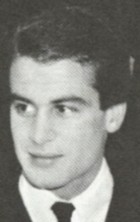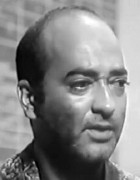
Single on Philips (Australia) late 1965 by acclaimed Sydney band that eschewed the Merseybeat-Fab Four aesthetic in favour of a wilder Rolling Stones–Pretty Things thing, making them the first true rebels of Australian rock..; the first Australian band which can be labelled “punk” (Howlspace)
By the time of Nervous Breakdown – the B-side of Wild About You – there had been so many personnel changes that the band had morphed into a new line-up that included no original members.
The Missing Links split up in April 1966. Doug Ford and Andy James formed Running Jumping Standing Still (see Diddy Wah Diddy). Ford was later in The Masters Apprentices, and James became a successful actor as Andy Anderson, reverting to his real surname. Founding member Ronnie Peel became better known as Rockwell T. James, particularly as a member of John Paul Young’s All Stars.
In 1976 The Saints remade Wild About You (written by Andy James) for their landmark first album (I’m) Stranded.
Reference: Ian McFarlane, The Encyclopedia of Australian Rock and Pop.
Further reading: To appreciate the Missing Links phenomenon in more detail, start with:
1. Milesago’s anecdote-packed Missing Links history by Andrew Ainsworth which covers the various line-ups and lists the subsequent activities of band member.
2. Howlspace’s Missing Links history [archived here].
On EMI France EP 100% Rock by band formed 1963 by French rock’n’roller Pat Winther (born Pierre-Patrick Vrolant, 1942) with his brother Bill.
All French lyrics on the EP (which included two other Eddie Cochran covers) are by Évelyne Verrechia, also known as 60s yé yé singer Evy and as Évelyn Lanton, lead singer of 70s disco band Belle Epoque.
References, further reading: 1. Release details and sleeve shots at encyclopedisque.fr, 2. History of Pat Winther at the website of his country music band Pat Winther & The Bunch. 3: On Évelyne/Evy Verrechia/Lanton see the English Wikipedia article on her brother and musical collaborator Albert.
Merci à Philippe.
 Single on W&G by popular rock’n’roll singer in the heart-throb mould, backed by The Tamlas.
Single on W&G by popular rock’n’roll singer in the heart-throb mould, backed by The Tamlas.
Merv Benton did especially well in his home town of Melbourne, where he had 15 charting records 1964-67, but retired from music after suffering disabling voice problems. Cincinnati Fireball was his most successful single outside of Victoria. See also I Got Burned, Benton’s biggest local hit.
Merv Benton emigrated to the United States and has lived for some time in Phoenix AZ.
Further reading: 1. Tony Wilkinson, The Story of Merv Benton, A True Australian Rocker from Rockabilly Hall of Fame [archived here]. 2. Merv Benton (& The Tamlas) at Milesago.
Single on El Paso label Eastwood, owned by Bobby Fuller.
Singer-songwriter and guitarist Bobby Fuller (1942-1966) had released some independent recordings on minor labels before his band The Bobby Fuller Four were signed to Mustang in Los Angeles in 1964. Fuller was a great admirer of fellow Texan Buddy Holly, one of his main influences along with such rockers as Eddie Cochran and Elvis Presley.
The Bobby Fuller Four’s big hit I Fought the Law (1966, #4) had been recorded by the post-Buddy Holly Crickets in 1959 and was written by Sonny Curtis, an early Buddy Holly associate who joined The Crickets after Holly’s death. The Bobby Fuller Four’s other charting single in the US was Love’s Made A Fool Of You (1966, #26) recorded by Holly in 1959 and written by him with Bob Montgomery.
The B-side of Nervous Breakdown was another Buddy Holly song, Not Fade Away.
References, further reading:
1. Bob Holdship’s 1997 history and appreciation of Bobby Fuller at Rockabilly Hall of Fame, with a note added by Fuller’s manager (page archived here).
2. Aaron J. Poehler is a fan, and his appreciation of Fuller’s work, The Strange Case of Bobby Fuller, also considers the circumstances of Fuller’s death, frequently speculated upon since 1966 [Internet Archive copy].
3. The Bobby Fuller recordings listed at Rockin’ Country Style give an idea of Fuller’s pre-Mustang releases. That site also has label shots of both sides of the Eastwood single.
4. The Wikipedia article on Bobby Fuller is useful, even if it has been tagged for lacking citations.
Recorded in 1958, released posthumously in UK June 1961 on London EP Cherished memories of Eddie Cochran. Released in USA January 1962 on Liberty album Never To Be Forgotten and on EP in 1963.
Eddie Cochran (1938-1960) was a US rockabilly singer and guitarist who progressed to rock’n’roll in the wake of Elvis Presley’s success. His best remembered songs, featuring rhythmic guitar and good-humoured lyrics, were Summertime Blues (1958, #8 USA, #6 UK) and C’mon Everybody (1959, #35 USA, #6 UK).
Cochran had three Top 40 hits in the US, but he was more popular in Britain where he had eleven charting songs including Three Steps To Heaven (#1 UK), a current release in Britain when he died there in a road accident in April 1960.

Mario Roccuzzo, writer of Nervous Breakdown, is better known today as an actor, having appeared in dozens of TV series, beginning with The Untouchables in 1960.
IMAGE: Mario Roccuzzo in The Hunted Lady (1977)
The story is told in the book Don’t Forget Me: The Eddie Cochran Story. In 1958 Roccuzzo was working at Wallichs Music City, a famous record store in Los Angeles. There he met store regular Eddie Cochran through the actor Corey Allen. Nervous Breakdown was written over some beers in Allen’s apartment. As Roccuzzo recalled it, he fed the words to Cochran as they were written: “I’d hand the lines to him: he’d sing ’em.”
*The song’s copyright was registered in 1962 to Roccuzzo alone but the anecdote above suggests Cochran (who died in 1960) had a hand in the composition. The YouTube video credits Lyricist: Roccuzzo, Composer: Cochran. See also BMI’s copyright listing.
References:
1. Julie Mundy and Darrel Highham, Don’t Forget Me: The Eddie Cochran Story, 2000.
2. Mario Roccuzzo’s biography at IMDb.
In Led Zeppelin’s Communication Breakdown (1969) the chord structure and the line “I’m having a nervous breakdown” have reminded some listeners of Nervous Breakdown, but it seems likely that the earlier song provided inspiration for Led Zeppelin rather than a rigid template.
from Terry Stacey
On 1974 album Ducks Deluxe by British pub rock band formed 1972.
At this time the band members were Sean Tyla (rg, kb), Nick Garvey (bg), Tim Roper (d) and Martin Belmont (lg). All four contributed vocals.
Nick Garvey later formed The Motors along with Andy McMaster, another Ducks Deluxe member who had left the band before Ducks Deluxe was recorded. McMaster wrote the Motors’ hit Airport (1978, #4 UK) and co-produced it with Garvey and Peter Ker.
When Ducks Deluxe broke up in mid-1975, Martin Belmont and recent addition Brinsley Schwarz joined Graham Parker And The Rumour.
Also in The Rumor was keyboardist Bob Andrews who had played on three tracks of Ducks Deluxe and had been in Brinsley Schwarz’s influential self-titled band with Nick Lowe and Billy Rankin.
Sources: 1. Album credits and sleeve shots at Discogs.com. 2. “The ‘Pub Rock’ Afterglow” in Pete Frame, The Complete Rock Family Trees (1993 edition) p.29. 3. Biographies at All Music, Discogs.com and Wikipedia linked in text.
B-side of Phonogram single Ce vieux cow-boy by French pop singer of the 60s (b. Gérard Blondiot, 1943). Also on the album Ce vieux cow-boy, recorded in Nashville.
Also recorded 2004/5 by French rock’n’roll revivalist Chris Evans (Christian Voron, b.1956) with the shorter title Je suis nerveux and released on the 2020 album Les Rocks les plus Torrides (the hottest rocks). [YouTube]. The album’s title is a nod to the 1964 Johnny Hallyday album Johnny, reviens ! Les Rocks les plus terribles). (This is not Chris Evans the American actor, nor is it Chris Evans the former Australian Senator. For example.)
Merci à Philippe deux fois.
B-side on Rivet by Sydney rockabilly and rock’n’roll revivalists The Mighty Guys. (Some contemporary accounts used the 1950s word bodgies to convey the band’s appeal to 1980s audiences.)
The band was formed by three thirtysomething musicians who had all been in notable Australian bands in the 1960s or 70s. Other members came and went but the original line-up was Leon Isackson (from The R’jays and The Rajahs), Mick Hamilton (The Vibrants), and Phil Eizenberg (The Ferrets). They were well-received at venues around Sydney, and they released a mini-album in 1981 then an LP in 1982. A collection, The Rest Of The Mighty Guys, came out in 1986.
Watch at Youtube: Interview with The Mighty Guys.
Further reading: 1. “Real Old Greaseballs”, profile by Susan Molloy in Sydney Morning Herald, 24 September 1982. 2. Mighty Guys discography at Discogs.com.
Merci à Philippe d’avoir repéré les bodgies.
On The Party Ain’t Over, 2011 album by rock’n’roll and country singer-guitarist Wanda Jackson (b.1937), produced by Jack White from The White Stripes.
The title of the album recalls her best-known song, the raucous Let’s Have A Party (1960) which peaked in the 30s on USA and UK charts. In Australia, where it became a staple of Saturday night “party time” radio shows, it was quite a hit, charting Top 10 in the five major cities, including #2 in Sydney and #3 in Adelaide.
Further reading: 1. Wanda Jackson biography at This is My Story. 2. Album review by Sarah Ventre for First Listen at NPR.
Some other later versions are listed at The Originals.
![]() Similar title but not the same song as ‘Nervous Breakdown’ by The Missing Links or Merv Benton.
Similar title but not the same song as ‘Nervous Breakdown’ by The Missing Links or Merv Benton.
Obscurities all round. According to Discogs.com, Ronnie Forte was the song’s composer Ronnie McCain. There is a dissenting comment on that at 45cat which also points us to Sir Shambling’s brief feature on McCain.
♫ Listen at YouTube
Merci à Philippe pour le hareng rouge.